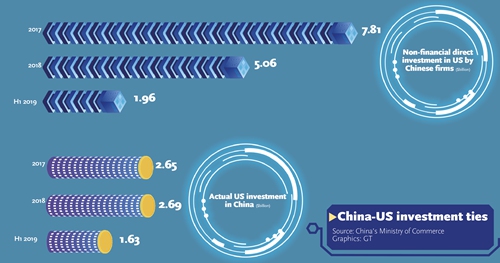HOME >> SOURCE
Uncertainty remains over date for signing phase one deal
By Wang Cong Source:Global Times Published: 2020/1/6 22:48:40
US’ unilateral statement, media speculation not final unless confirmed by China: analyst

Photo: VCG
There is still uncertainty regarding when China and the US will sign the phase one trade agreement as final details remain to be worked out and other complicating factors have arisen, such as the escalating conflict between the US and Iran, Chinese analysts said on Monday.Unilateral announcements from US officials and media speculation about the date and other details about the signing ceremony should not be taken as final until they are confirmed by Chinese officials, the analysts noted.
Since Chinese and US officials agreed on the text of the phase one trade agreement, there has been much speculation about the time for signing the widely anticipated deal. The South China Morning Post (SCMP) reported on Sunday that China's trade delegation will travel to Washington on January 13 to sign the deal. The SCMP last week reported that the trip was scheduled for Saturday.
US officials have also been unilaterally announcing different dates for the signing ceremony. US Trade Representative Robert Lighthizer previously suggested the deal could be signed in the first week of January. US President Donald Trump last week said that the deal would be signed on January 15 at the White House.
No final date
"This is nothing strange because the US has always been rushing to unilaterally release information because it is anxious to gain some points, but nothing is final unless China also makes the same announcement," He Weiwen, a former senior trade official and an executive council member of the China Society for World Trade Organization Studies, told the Global Times on Monday.
But Chinese officials have not confirmed either Trump's tweet or the SCMP's report. Asked about Trump's tweet on Friday, Geng Shuang, a spokesperson for the Chinese Foreign Ministry, declined to comment and referred questions to the Commerce Ministry, which had maintained that both sides were still working on legal and translation reviews of the deal.
He noted that China would not be swayed by unilateral announcements from the US or media speculation. "China will move forward at its own pace in the trade talks, as it has always done," he said, adding that the US has a tendency to prematurely and selectively disclose information to its favor, including some content of the unsigned agreement.
Since announcing the agreement on the text of the phase one deal, US officials have released some points of the deal, including China's purchase of US goods, while Chinese officials remained cautious in releasing the content of the deal, insisting that it will be released only after the deal is signed.
"I think the phase one trade agreement did not come easily, so it's important that we focus on implementation of the deal," Wei Jianguo, a former Chinese vice commerce minister, told the Global Times on Monday, noting that caution is necessary prior to the signing of the phase one deal.

Graphics: GT
Rising complicationApart from the uncertainty over the specific date, there are also increasing complications for the signing of the phase one trade agreement, such as rising tensions between the US and Iran, which could complicate scheduling for the signing of the trade agreement, analysts said.
"Geopolitical flare-ups might have some impact on the trade negotiations," Li Yong, a deputy chairman of the expert committee of the China Association of International Trade, told the Global Times on Monday. He noted that US officials could be preoccupied in dealing with "the situation."
Also, even after the agreement on the text of the phase one deal, the US has continued to escalate tensions over technology. The US on Monday put in place new rules that would restrict exports of certain technology to China, including artificial intelligence software.
However, despite the uncertainty, the trade one deal is likely to be signed soon and talks over a second phase agreement could commence shortly thereafter, as both sides appear eager to continue talks to resolve the long-running trade conflict that remains a major drag on global economic growth, Chinese analysts said.
Posted in: ECONOMY,CHINA-US FOCUS